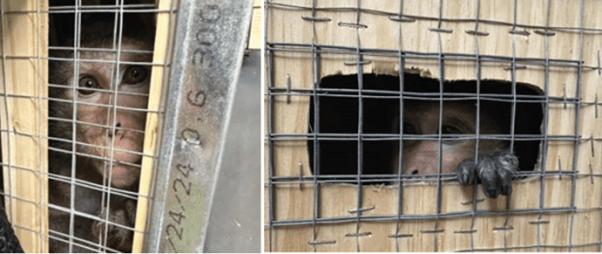Photos: Dead Monkey Discovered in Dangerous Shipment to U.S. Labs, PETA Urges Investigation
For Immediate Release:
November 14, 2024
Contact:
Tasgola Bruner 202-483-7382
The faces of frightened monkeys. Stacks of tiny, rickety wooden crates, some caked in blood and feces. The body of a monkey who died inside one of them. These are some of the images in photos released today by PETA revealing the stark reality of monkeys shipped for use in laboratories, including one shipment of 332 monkeys from Brussels to the U.S. on a plane operated by Smartlynx Airlines Malta Ltd.
The long-tailed macaques were reportedly bound for Inotiv, a monkey importer implicated in a recent international monkey-smuggling trial. So far this year, more than 10,000 monkeys have been imported to the U.S. in similar conditions to be used and killed in experiments.
PETA filed a complaint with the U.S. Department of Agriculture urging it to investigate SmartLynx for failing to transport the monkeys in secure cages that were properly constructed and labeled. None of the crates appeared to be marked to show it contained live animals, as required, or even which was the correct upright position.
PETA also demanded an explanation from the Centers for Disease Control and Prevention (CDC) for apparently failing to inspect the monkeys or even be present, as would be expected given the agency’s awareness of the increasing number of shipments arriving with infected animals, when the plane landed at New York’s John F. Kennedy Airport on July 18. Since one of the monkeys was found dead in a crate in Brussels, the CDC should have been concerned about the possibility of disease that may have affected the other monkeys and that could be transmissible to humans.

Stichting Animal Rights, a Netherlands-based animal protection group, provided PETA with the photos and reports that it had received through an open records request. The monkeys were originally from Vietnam.
“Every glimpse behind the curtain of the monkey-importation pipeline reveals suffering, disease, death—and authorities looking the other way,” says PETA primate scientist Dr. Lisa Jones-Engel. “PETA wants answers to the questions that we have repeatedly posed—why are the CDC, USDA, and the U.S. Fish & Wildlife Service allowing shipments of potentially diseased monkeys into the U.S.?”
An in-transit monkey death is particularly concerning amid a recent surge in monkeys imported from Asia arriving infected with deadly zoonotic mycobacteria, bacteria, and viruses. In 2023, Netherlands, France and Spain saw outbreaks of tuberculosis among shipments of monkeys from Vietnam. Multiple shipments of monkeys infected with diverse strains of tuberculosis have arrived in the U.S. and monkeys from Cambodia have arrived infected with a bacterium so deadly that the U.S. classifies it as a bioterrorism agent.
Nearly every major airline in the world has stopped shipping monkeys for use in cruel and deadly experiments.
PETA—whose motto reads, in part, that “animals are not ours to experiment on”—points out that Every Animal Is Someone and offers free Empathy Kits for people who need a lesson in kindness. For more information, please visit PETA.org or follow the group on X, Facebook, or Instagram.


